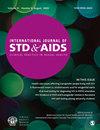Kikuchi-Fujimoto lymphadenitis in a patient with human immunodeficiency virus infection: The importance of precision pathology
IF 1.4
4区 医学
Q4 IMMUNOLOGY
引用次数: 0
Abstract
BackgroundKikuchi-Fujimoto lymphadenitis (or histiocytic necrotising lymphadenitis) is a rare disease that is usually benign and self-limiting. A higher prevalence is reported amongst East Asian populations. No clear etiology has been identified although it has been associated with some viruses, rarely the Human Immunodeficiency Virus (HIV) and autoimmune pathologies. To date, there has only been a handful of cases reported globally in association with HIV, and this association is even rarer in the Asian context.Case presentationA 20-year-old Asian ethnic Malay male, with no past medical history, presented with daily fevers and chills for 2 weeks associated with constitutional symptoms and bilateral non-tender cervical, axillary and inguinal lymphadenopathy. Full blood count showed lymphocytosis with large granular lymphocytes. HIV viral load returned positive at >10 million copies/mL. His absolute CD4 T helper cell count was 375 cells/uL (7%). The rest of the infective and autoimmune workup were negative. Excision biopsy of an enlarged left cervical lymph node revealed Kikuchi lymphadenitis in the proliferative phase, with no evidence of lymphoproliferative disease. He was started on anti-retroviral therapy with resolution of the lymphadenopathy in 3 months.ConclusionWe present a case of Kikuchi lymphadenitis associated with HIV. This highlights that Kikuchi lymphadenitis may mimic sinister pathologies (such as tuberculosis and lymphoma) and that it needs to be considered in the differential diagnosis before empirical treatment for tuberculosis or invasive investigations for lymphoma are done.人类免疫缺陷病毒感染患者的菊池-藤本淋巴结炎:精确病理学的重要性
背景菊池-藤本淋巴结炎(或组织细胞坏死性淋巴结炎)是一种罕见的疾病,通常是良性和自限性的。据报道,该病在东亚人群中发病率较高。虽然该病与某些病毒(很少与人类免疫缺陷病毒(HIV))和自身免疫性病变有关,但尚未发现明确的病因。病例介绍 一名 20 岁的马来亚裔男性,无既往病史,2 周来每天发热和寒战,伴有全身症状和双侧无触痛的颈部、腋窝和腹股沟淋巴结病。全血细胞计数显示淋巴细胞增多,并伴有大颗粒淋巴细胞。艾滋病毒病毒载量呈阳性,为 1000 万拷贝/毫升。他的 CD4 T 辅助细胞绝对计数为 375 cells/uL(7%)。其他感染和自身免疫检查结果均为阴性。左颈部肿大淋巴结的切除活检显示,菊池淋巴结炎处于增殖期,没有淋巴增生性疾病的证据。他开始接受抗逆转录病毒治疗,3 个月后淋巴结病得到缓解。这突出表明,菊池淋巴结炎可能会模仿一些险恶的病症(如肺结核和淋巴瘤),因此在对肺结核进行经验性治疗或对淋巴瘤进行侵入性检查之前,需要将菊池淋巴结炎考虑在鉴别诊断中。
本文章由计算机程序翻译,如有差异,请以英文原文为准。
求助全文
约1分钟内获得全文
求助全文
来源期刊
CiteScore
2.60
自引率
7.10%
发文量
144
审稿时长
3-6 weeks
期刊介绍:
The International Journal of STD & AIDS provides a clinically oriented forum for investigating and treating sexually transmissible infections, HIV and AIDS. Publishing original research and practical papers, the journal contains in-depth review articles, short papers, case reports, audit reports, CPD papers and a lively correspondence column. This journal is a member of the Committee on Publication Ethics (COPE).

 求助内容:
求助内容: 应助结果提醒方式:
应助结果提醒方式:


